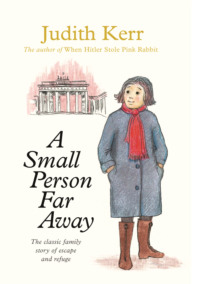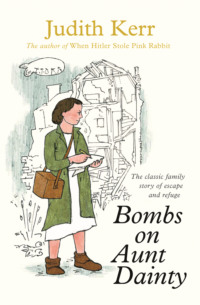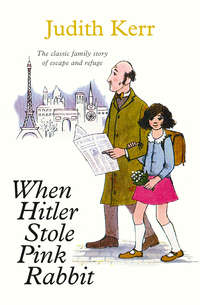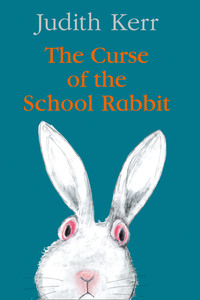
Полная версия
Out of the Hitler Time trilogy: When Hitler Stole Pink Rabbit, Bombs on Aunt Dainty, A Small Person Far Away
The school building seemed dark and chilly after the brightness outside, but Anna looked forward each morning to seeing Colette, who had become her special friend, and her teacher Madame Socrate. Though she still found the school day long and tiring she was beginning to understand more of what was going on. The mistakes in her dictations had gradually been reduced to fifties instead of hundreds. Madame Socrate continued to help her during the lunch break, and she now managed sometimes to answer a question in class.
At home Mama was becoming a really good cook, helped with advice from Madame Fernand, and Papa said he had never eaten so well in his life. The children learned to enjoy all sorts of food they had never even heard of before and to drink a mixture of wine and water with their meals, like French children. Even fat Clothilde in the school kitchen approved of the lunches Anna brought for her to reheat.
“Your mother knows how to do things,” she said, and Mama was delighted when Anna told her.
Only Grete remained gloomy and discontented. No matter what Mama served up she always compared it unfavourably with some Austrian version of the same dish, and if it was something you could not get in Austria Grete did not think you should eat it at all. She had an amazing resistance to everything French and did not seem to get any better at speaking the language even though she went to classes every day. Since the promises she had made to her mother continued to prevent her from being of much help to Mama, everyone, including Grete, looked forward to the time when she would return to Austria for good.
“And the sooner the better,” said Madame Fernand who had been able to observe Grete at close quarters, for the two families still spent most of their Sundays together. As spring turned into summer, instead of meeting at their homes they went out to the Bois de Boulogne which was a large park not too far away and the children played ball games on the grass. Once or twice Monsieur Fernand borrowed a friend’s car and drove them all out to the country for a picnic. To Anna’s joy the cat came too on these occasions. It did not seem to mind being put on a lead and, while Francine chattered to Max, Anna proudly took charge of it, holding on to the lead when the cat wanted to climb a tree or a lamp-post and following with the lead held high above her head when the cat decided to walk along the top of some railings instead of along the bottom.
In July it became very hot – much hotter than it had ever been in Berlin. There seemed no air at all in the little flat even though Mama kept all the windows open all the time. The children’s bedroom especially was stifling and the courtyard it overlooked seemed almost hotter than the inside. It was difficult to sleep at night and nobody could concentrate on lessons at school. Even Madame Socrate was tired. Her frizzy black hair went limp with the heat and everyone longed for the end of term.
On the fourteenth of July not only the schools but the whole of France had a holiday. It was the anniversary of the French Revolution, and there were flags everywhere and fireworks in the evening. Anna and Max went to see them with their parents and the Fernands. They took the Metro, which was packed with cheerful people, and among a crowd of other Parisians they climbed a long flight of steps up to a church on top of a hill. From here they could see right across Paris, and as the fireworks began to explode against the dark blue sky everyone shouted and cheered. At the end of the display someone started to sing the Marseillaise, then someone else joined in, and soon the whole huge crowd was singing together in the hot night air.
“Come on, children!” cried Monsieur Fernand, and Anna and Max joined in too. Anna thought it sounded wonderful, especially an unexpected slow bit that came in the middle of the song, and she was sorry when it ended.
The crowds began to leak away down the steps and Mama said, “Home to bed!”
“Good heavens, you can’t send them to bed now. It’s the fourteenth of July!” cried Monsieur Fernand. Mama protested that it was late, but the Fernands only laughed at her.
“It’s the fourteenth of July,” they said, as though this explained everything. “The evening has hardly begun!”
Mama looked doubtfully at the children’s excited faces. “But what …?” she began.
“First,” said Monsieur Fernand, “we are going to eat.”
Anna was under the impression that they had eaten already, for they had had boiled eggs before they came out – but clearly this was not the sort of eating Monsieur Fernand had in mind. He took them to a large busy restaurant where they sat at a table outside on the pavement and ordered a meal.
“Snails for the children!” cried Fernand. “They’ve never tried them.”
Max stared at his portion in horror and could not bring himself to touch them. But Anna, encouraged by Francine, tried one and found that it tasted like a very delicious mushroom. In the end she and Francine ate Max’s snails as well as their own. Towards the end of the meal, while they were spooning up cream puffs, an old man arrived with a stool and an accordion. He sat down and began to play, and soon some of the people left their tables to dance in the street. A cheerful looking sailor appeared at Mama’s side and invited her to dance. Mama was surprised at first but then she accepted and Anna watched her being whirled round and round, still looking astonished but pleased. Then Monsieur Fernand danced with Francine, and Anna danced with Papa, and Madame Fernand said she did not feel like dancing just yet because she could see that Max would absolutely hate it, and after a while Monsieur Fernand said, “Let’s move on.”
It was cooler now and Anna did not feel at all tired as they wandered through the crowded streets. There were accordions and people dancing everywhere, and every so often they stopped and joined in. Some cafés were serving free wine to celebrate the occasion and when they felt like a rest the grown-ups stopped for a drink and the children had cassis, which was blackcurrant juice. They saw the river shining in the moonlight and the cathedral of Notre Dame squatting like a great dark creature in the middle. At one time they walked along the bank and under the bridges, and there were accordion players and people dancing here too. They went on and on until Anna lost all sense of time and just followed Monsieur Fernand in a happy daze.
Suddenly Max said, “What is that funny light in the sky?”
It was the dawn.
By this time they had reached the main Paris market, and carts loaded with fruit and vegetables were rumbling over the cobblestones all about them.
“Hungry?” asked Monsieur Fernand.
It was ridiculous since they had already eaten two suppers, but everyone was starving. There was no accordion music here, only people getting ready for the day’s work, and a woman in a small café was serving bowls of steaming onion soup. They ate great bowlfuls, sitting on wooden benches with the market people, and mopped up the remains with hunks of bread. When they came out of the café it was daylight.
“Now you can put the children to bed,” said Monsieur Fernand. “They have seen the fourteenth of July.”
After a sleepy farewell they rode home on the Metro among late revellers like themselves and people going to work, and collapsed into their beds.
“We never had a fourteenth of July in Germany,” said Anna just before she fell asleep.
“Well, of course not,” said Max. “We didn’t have the French Revolution!”
“I know that,” said Anna crossly and added, just as sleep was about to overtake her, “but wasn’t it lovely!”
Then the summer holidays were upon them. Just as they were wondering how to spend them, a letter arrived from Herr Zwirn inviting the whole family to the Gasthof Zwirn as his guests – and just as they were wondering where to get the money for the fares, Papa was asked to write three articles for a French newspaper. This paper paid him so much more than his normal fees from the Daily Parisian that it solved the problem.
Everyone was delighted at the prospect, and to top it all on the last day of term Max brought home a good report. Mama and Papa could hardly believe their eyes when they saw it. There was not a single “Does not try” or “Shows no interest”. Instead there were words like “intelligent” and “hard-working” and the headmaster’s comment at the bottom of the sheet said that Max had made remarkable progress. This made Mama feel so cheerful that she absent-mindedly bade quite a fond farewell to Grete, who was going to Austria at last. They were all so pleased to get rid of her that they felt they must be extra nice to her, and Mama even gave her a small scarf.
“I don’t know if this sort of thing is worn in Austria,” said Grete glumly when she saw it, but she took it anyway. And then they themselves set off for Switzerland.
The Gasthof Zwirn was quite unchanged. Herr and Frau Zwirn were as kind and warm-hearted as ever, and after the heat in Paris the air by the lake was wonderfully fresh. It was nice to hear the familiar German-Swiss dialect and to be able to understand everything people said instead of only half, and Franz and Vreneli were ready to pick up their friendships with Anna and Max exactly where they had left off. In no time at all Vreneli was bringing Anna up to date about the red-haired boy who had apparently taken to looking at Vreneli in a certain way – a warm sort of way, said Vreneli – which she could not describe but which appeared to please her. Franz carried Max off to fish with the same old fishing rod, and they all played the same games and walked along the same paths in the woods which they had enjoyed so much the previous year. It was all exactly as it had been, and yet there was something about this very sameness that made Anna and Max feel a little like strangers. How could the Zwirns’ lives have stayed so much the same when their own had become so different?
“You’d think just something would have changed,” said Max, and Franz asked, “What sort of thing?” but Max did not know himself.
One day Anna was walking through the village with Vreneli and Roesli when they met Herr Graupe.
“Welcome back to our beautiful Switzerland!” he cried, shaking her hand enthusiastically, and soon he was asking her all sorts of questions about school in France. He was convinced that nothing could compare with his own village school and Anna found herself sounding almost apologetic when she explained that she liked it all very much.
“Really?” said Herr Graupe incredulously, while she described the work, and her lunches with Clothilde in the school kitchen, and Madame Socrate.
And then an odd thing happened to her. Herr Graupe was asking her something about the French school-leaving age which she did not know – but instead of telling him so in German she found herself suddenly shrugging her shoulders and saying, “Je ne sais pas” in her best Parisian accent. She was horrified as soon as she had said it. She knew he would think that she was showing off. But she hadn’t been. She could not even understand where the words had come from. It was as though somewhere inside her something were secretly thinking in French – and that was ridiculous. Since she had never been able to think in French in Paris, why should she suddenly start now?
Конец ознакомительного фрагмента.
Текст предоставлен ООО «ЛитРес».
Прочитайте эту книгу целиком, купив полную легальную версию на ЛитРес.
Безопасно оплатить книгу можно банковской картой Visa, MasterCard, Maestro, со счета мобильного телефона, с платежного терминала, в салоне МТС или Связной, через PayPal, WebMoney, Яндекс.Деньги, QIWI Кошелек, бонусными картами или другим удобным Вам способом.










